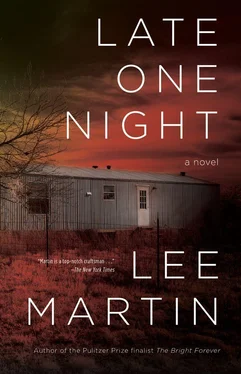Finally, as he stood here with Shooter, he knew what it was that was troubling him. That sleeve. A patch of the vinyl was missing and the lining beneath it was ratty with holes. Biggs swore that when he recalled those holes he could see charred edges, as if they’d been burned into the material.
“Where’s your boy’s jacket?” he asked Shooter now. “The one he had with him when I was here before. I want to look at it.”
“That jacket?” Shooter said. “Well, that jacket was old.”
“He can’t show it to you.” Captain’s voice startled Biggs. The boy had come down the hallway that led from the living room to the bedrooms. How long he’d been standing there, listening, Biggs didn’t know. “He burned it,” Captain said. “He put it in the burn barrel and set it on fire.”
“Like I said.” Shooter’s voice all of a sudden got too bright and cheery. “It was old.”
“I’m tired of lying.” Captain stepped out of the hall and fully into the light of the living room. “I want to tell the truth.”
So it was Captain who told Biggs the story of what happened the night of the fire. He stood in his own house, his father no longer able to keep him quiet, and he said all of it, starting with what his father had said about that goat pen and how it would be best to put a match to it and start over.
“I got worried about the goats that night,” Captain said, “and I went outside to check on them. I remembered what my dad said, and I thought I could help Della.”
He took his time. Biggs could tell that the boy had thought about this moment when he’d go against his father’s wishes and confess everything, had steeled himself for it and was now reciting the facts with little show of emotion. He told Biggs about leading the goats over to his father’s barn. It was just the billy, Methuselah, he said, that wouldn’t go.
“He charged at me, but, finally, he settled down. He saw Ronnie there, and he just stopped.”
“So Ronnie was behind the trailer?” Biggs said. “Just like you told me earlier? You’re sticking by that?’
For a long time Captain didn’t say a word. He looked down at his feet. Then he raised his head. His lip trembled. “Yes,” he finally said, “Ronnie was there.”
Captain was talking fast now, telling Biggs how Methuselah got stirred up again and came charging at him, butted him in the stomach and sent him sprawling backwards into the snow. Then Captain was back on his feet and trying to get away from the goat, running, spinning in circles, dodging this way and that. He unzipped his jacket and slipped his arms out of the sleeves. He stood still and let Methuselah come at him. Then, when the goat was close enough, he threw his jacket over his face and stepped to the side.
But Biggs wanted to know what Ronnie was doing when Captain saw him.
“He wasn’t doing anything,” Captain said.
“Was there gasoline?” Biggs kept his voice low and as gentle as he could manage, coaxing Captain. “Son, listen to me now. Did you see Ronnie pour gasoline on that trailer?”
Captain said, “No, I didn’t see him do that.”
“But you told me you did. Said he slopped it all over that trailer and lit it up. Son, were you lying?”
“Wesley.” Shooter’s voice was flat and worn out, as if he were giving in to what he knew he couldn’t stop. “Tell him the rest.”
At the courthouse, Ronnie told the deputy that when he drove back to town that night, the smell of gas was too much for him. He had the Marathon can resting on the floor in front of the passenger seat, and he couldn’t bear to hear the gas that was left in it sloshing around.
“I was disgusted with myself,” he said. “So I pulled over to the side of the road, and I got that can out, and I poured what was left into my car, as much as it’d hold anyway.”
The deputy said, “There was about a gallon left in it when we found it in Brandi’s shed.”
“That sounds about right,” said Ronnie. “That was all I could do. So I went back into town, and I put that can in the shed and then went in to go to bed.”
Captain said, “We were in the bathroom when we first saw the fire. My dad went to the phone to call 911, and I ran out the front door and across the road. Angel and Hannah were outside. I ran around the end of the trailer to see if I could get in the back door. People think I’m stupid, but I knew what was happening. That trailer was on fire, and Della and the other kids were inside, and they needed help.”
The whole back side of the trailer was in flames — flames leaping up to the windows, the siding already curling and melting, the back door wreathed with fire.
For the first time since he’d begun to tell his story, Captain’s voice quavered. He bit his lip. He closed his eyes, squeezed them shut so tightly his face pinched up in a grimace. “There wasn’t anything I could do,” he finally said in a shaky whisper.
Shooter kept quiet. He let Captain tell his story.
“Then I saw Methuselah,” he said.
The goat, calm now, had Captain’s bomber jacket in his mouth. The sleeve of that jacket had gotten wrapped around one of his forelegs.
“It was on fire,” Captain said. “My jacket sleeve. It was burning.”
So was Methuselah, the vinyl of the burning sleeve melting into his hair and the skin beneath it. Captain ran to him.
“I threw my arms around him,” he said, “and I wrestled him down. I hoped the snow would put out the fire.”
Which it did. Captain got the bomber jacket free from Methuselah. Then he let the goat up and watched it run, disappearing into the night — into the place where the darkness held, black and deep, in spite of the fire.
When Captain got back around front, his father was there, and soon Pat Wade came running from his house, and Della was handing one of the twins out to Shooter. Captain stepped up and took her in his arms, tears running down his cheeks now because he knew.
“I knew exactly what had happened,” he said. “I didn’t want to know it, but I did.”
For a good while, no one said a word. The clock ticked. The refrigerator hummed. The furnace clicked on.
Biggs waited for Captain to tell the rest of his story, but it was Shooter who spoke next. He said, “That vinyl from Captain’s coat melted into that goat’s leg, and I couldn’t get it out. When the fire marshal’s deputies started coming around, I was afraid they’d see it, and I didn’t want them to know that Captain had been anywhere near that fire. That’s why I put that goat down. I couldn’t take the chance.”
Biggs could see the guilt that must have wracked Shooter all those weeks. He could see it deep in his eyes — the pain he’d never be able to rid himself of, not even now that the story had been told. The telling only made it worse. The telling made it true.
“I had to protect Wesley,” Shooter said.
His Adam’s apple slid up and down his throat as he swallowed words he could hardly make himself say. Finally, though, he said them, and, when he did, Biggs felt his heart catch. He was a father, too.
“You’re telling me your boy started that fire,” Biggs said.
“I was afraid you’d take him away from me if the truth got out. Put him in a juvenile home. Or worse, try him as an adult and lock him up. I promised his mother I’d always look out for him.”
Biggs said to Captain, “Son, you need to tell me everything. If you started that fire, I need you to tell me exactly how you did it.”
It was a trick that Ronnie had showed him, a trick Captain had tried and tried to master and finally had.
That night behind the trailer, he said to Ronnie, “I won’t tell anyone.”
Ronnie knew he was saying he wouldn’t let it out that he’d been there, wouldn’t say a word about the gasoline. Captain was telling him he’d keep it all a secret. There was still time then to believe that such a thing was possible, that they could go their separate ways, step back into their lives and no one would be the wiser.
Читать дальше












